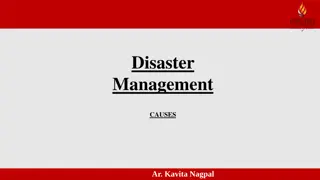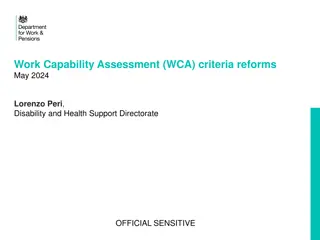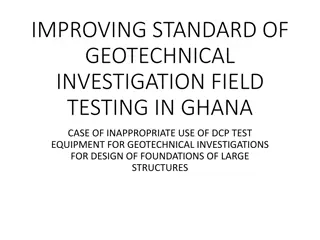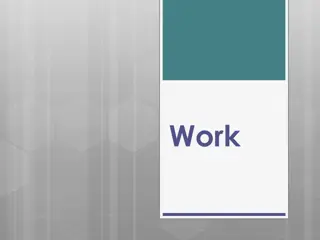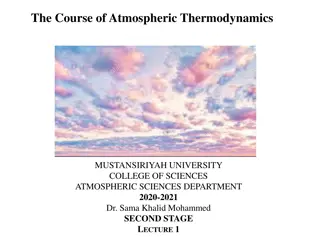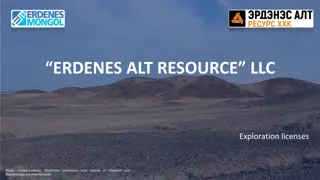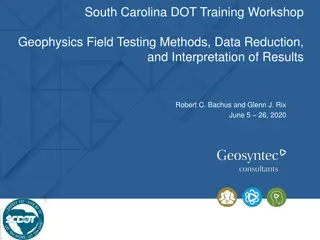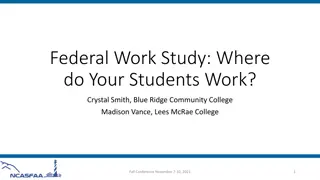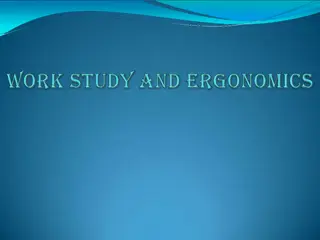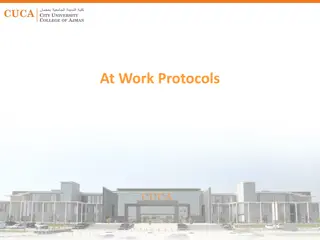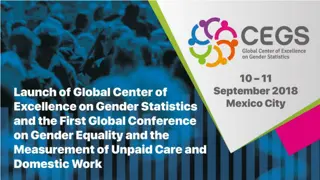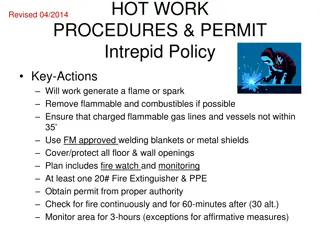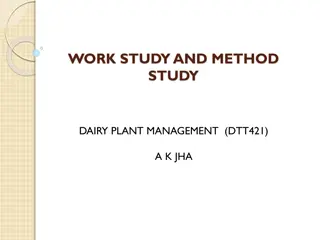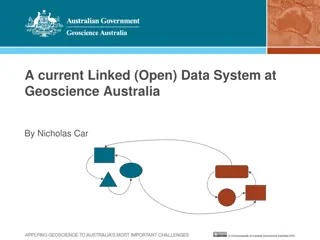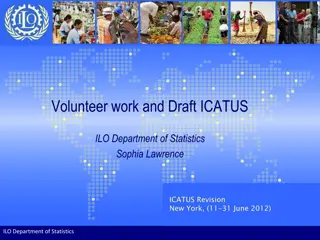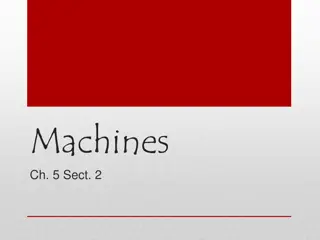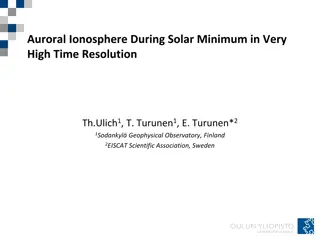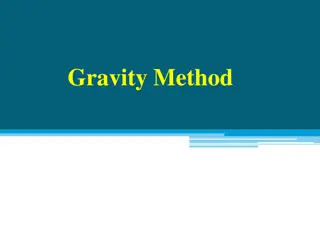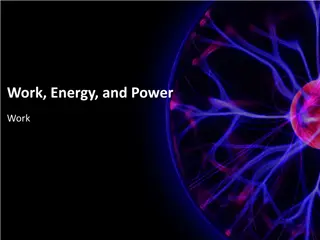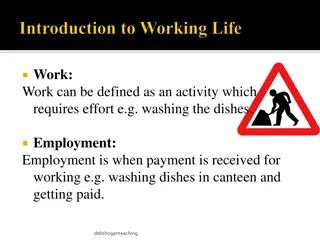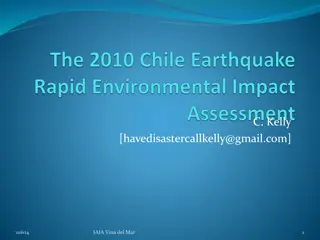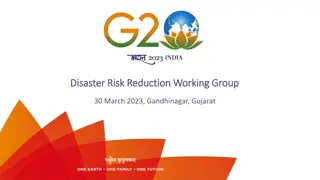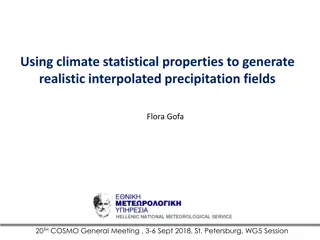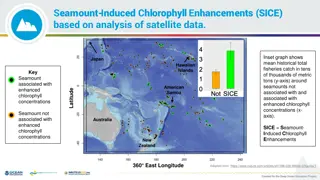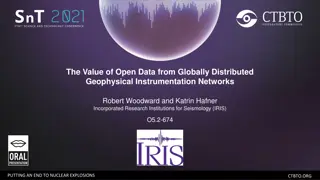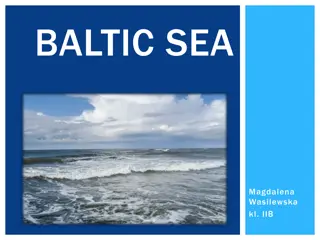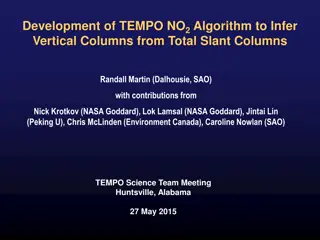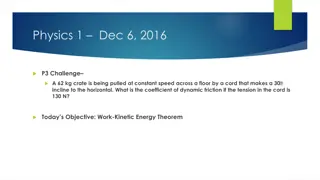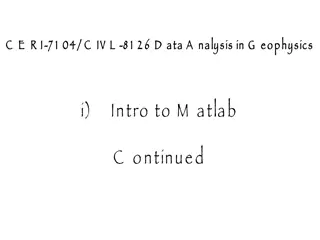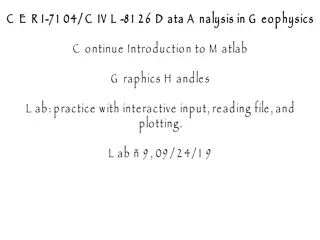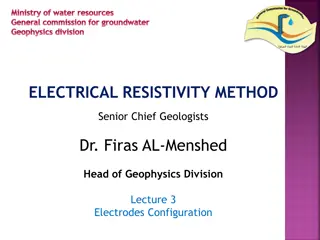The Importance of Work Experience in Career Development
Understanding the significance of work experience in shaping career paths is crucial for young individuals. Mentioning work experience in UCAS statements and apprenticeship applications can highlight key skills and industry knowledge. Testimonials emphasize the value of gaining practical insights an
0 views • 15 slides
Understanding Natural Disasters and Their Causes
Explore the various types of natural disasters such as meteorological, geophysical, hydrological, climatological, and biological events, each with unique causes like storms, earthquakes, floods, droughts, wildfires, and more. Learn how these disasters impact the environment and living organisms.
9 views • 16 slides
Work Capability Assessment (WCA) Criteria Reforms May 2024
The Work Capability Assessment (WCA) determines if individuals claiming ESA and/or UC have limited capability for work (LCW) or work-related activity. Reforms aim to better support disabled individuals to engage with work. Consultation responses highlighted the need for changes in assessing disabili
0 views • 6 slides
Enhancing Geotechnical Investigation Methods in Ghana for Foundation Design of Large Structures
Enhancing the standard of geotechnical investigation field testing in Ghana is crucial to ensure appropriate use of equipment like DCP for designing foundations of large structures. Objectives include assessing site suitability, obtaining design inputs, anticipating construction challenges, and esti
0 views • 31 slides
Understanding Work in Physics
Exploring the concept of work in physics, this content covers how work is performed, when it is done, and the formula to calculate work based on force and distance. It highlights that the amount of work depends on the force applied and the distance moved, showcasing that different paths may require
0 views • 18 slides
Understanding Geopotential and Geopotential Height in Atmospheric Thermodynamics
Explore the concept of geopotential and geopotential height in atmospheric sciences, focusing on their significance in understanding gravitational and centrifugal forces on Earth. Learn about the definition, calculation, and applications of geopotential height in relation to atmospheric properties a
1 views • 14 slides
Exploration Licenses in Mongolia: ERDENES.ALT.RESOURCE.LLC Projects Overview
ERDENES.ALT.RESOURCE.LLC holds exploration licenses for projects in Mongolia, specifically the Mukhar Khar Tolgoi licensed exploration area. This area shows potential for porphyry deposits based on geochemical factors, with drilling research indicating anomalous metal contents. The company has compl
1 views • 10 slides
Geophysics Field Testing Workshop: Methods and Interpretation
This workshop on geophysics field testing covers a range of methods such as downhole and surface testing, spectral analysis, seismic refraction, and more. Geophysical investigations help assess subsurface properties efficiently and non-invasively, offering valuable insights for site exploration and
1 views • 16 slides
UCL Staff Feedback on Hybrid Work Model Implementation
UCL conducted a survey among staff to gather feedback on the interim guidance for transitioning back to onsite work. The survey highlighted staff support for a hybrid work model, emphasizing productivity, efficiency, and well-being benefits. Staff also expressed a preference for clear expectations a
2 views • 21 slides
Federal Work Study: Student Work Locations and Future Ideas
Explore insights from the Fall Conference 2021 on Federal Work Study (FWS), including student work locations, impacts of Covid, and ideas for the future. Learn about part-time employment opportunities for eligible students, on-campus and off-campus work options, and tips from Blue Ridge Community Co
0 views • 13 slides
Understanding Work Study Methods in Industrial Engineering
Work study involves the systematic examination of methods to improve resource utilization and set performance standards. It includes method study, work measurement, and ergonomics to enhance efficiency and economy in various activities. Method study analyzes work processes for improvement, while wor
1 views • 21 slides
Work Protocols and Safety Measures for Employees Returning to Work
In the wake of the COVID-19 pandemic, these work protocols emphasize roles, responsibilities, and mental wellbeing of employees. Pre-work precautions at home, personal measures, testing procedures, increasing awareness, and safe travel guidelines are highlighted to ensure a secure work environment.
0 views • 16 slides
Understanding Medical Social Work and Its Impact on Patient Well-being
Medical Social Work, also known as Health Care Social Work, plays a crucial role in addressing the social, physical, and psychological needs of patients. Through providing case work, after-care, and convalescence services, Medical Social Workers contribute to reducing hospital readmissions, preventi
0 views • 12 slides
Gender Disparities in Unpaid Care Work and Earnings in China
Examination of gender discrepancies in unpaid care work and its impact on earnings in China using data from the 2008 China Time Use Survey. Women predominantly perform unpaid care work at home, limiting their labor market participation and contributing to gender pay gaps. The study explores the econ
0 views • 22 slides
Hot Work Procedures and Permits - Intrepid Policy Revised 04/2014
The Intrepid Policy outlines procedures and precautions for hot work, which includes operations involving open flames or heat production. The policy emphasizes safety measures such as flame removal, use of welding blankets, and obtaining permits. Alternative cold work methods are also suggested to e
0 views • 18 slides
Techniques for Improving Productivity in Dairy Plant Management
Work study and method study are essential techniques for enhancing productivity in dairy plant management. Work study involves method study and work measurement to analyze work processes, develop efficient methods, and determine standard times. Method study focuses on recording and evaluating work m
0 views • 11 slides
Introduction to Linked Data in Geoscience Australia
Linked Data is a publishing paradigm that elevates both web pages and data to first-class citizens of the Web, enabling a global data space evolution. This concept, as explored in Geoscience Australia, involves the utilization of Semantic Web standards to promote common data formats and exchange pro
1 views • 23 slides
Understanding Volunteer Work in Statistical Frameworks
Volunteer work is defined as unpaid, non-compulsory work individuals undertake for organizations or directly for others outside their household. The measurement of volunteer work aligns with promoting decent work, encompassing both goods and services produced within and beyond the System of National
0 views • 14 slides
Understanding Machines: Work, Forces, and Efficiency
Machines play a vital role in making work easier by increasing force, distance, or changing the direction of applied force. Different types of machines like levers, pulleys, and inclined planes simplify work processes. Understanding input and output forces, as well as input and output work, is essen
1 views • 10 slides
Evolution of Geomagnetic Methods in Applied Geophysics and Their Diverse Applications
Explore the rich history of geomagnetic methods from ancient Chinese lodestone use to modern magnetic surveying technologies. Learn about the principles of magnetics surveying, applications in locating metal objects, mapping near-surface features, mineral exploration, and geological bedrock mapping.
9 views • 36 slides
Cutting-edge Technology at Sodankyl Geophysical Observatory
The Sodankyl Geophysical Observatory in Finland utilizes state-of-the-art technology for ionospheric research, including the Alpha-Wolf sounder, a sophisticated transmitter, and receiver array. The observatory has a rich history of ionosonde operations since 1957, with continuous advancements in dat
2 views • 23 slides
Understanding Geophysics: Methods, Branches, and Applications
Geophysics applies physics principles to study Earth's physical processes and properties, contributing to scientific and economic advancements. The field encompasses various branches such as Solid Earth Geophysics and Exploration Geophysics, with scopes including natural hazard studies and resource
0 views • 25 slides
Understanding Work, Energy, and Power in Physics
Work, Energy, and Power are fundamental concepts in physics. Work is the transfer of energy that results in displacement, requiring a force applied over a distance. Energy is the capacity to do work, while Power is the rate at which work is done. Examples illustrate how work is calculated in differe
0 views • 67 slides
Exploring Work and Employment Dynamics
Work involves activities that require effort, while employment entails receiving payment for work done. Employers hire workers who work for them, while self-employed individuals work for themselves. Leaving school for the working world presents challenges like time and money management, new relation
0 views • 33 slides
High-Resolution 3D Seafloor Topography Enhancement Using Kalman Filtering
Proposing a Kalman Filter approach to refine seafloor topography estimation by integrating various geophysical data types. The method allows for producing regional bathymetry with higher resolution, truncating unnecessary observations, and reducing the matrix dimensions in the inverse problem. Inclu
0 views • 9 slides
Environmental Impact Assessment and Recovery Planning After the 2010 Chile Earthquake
The presentation discusses the Rapid Environmental Impact Assessment (REA) process conducted by a team of Chileans post the 2010 earthquake. It emphasizes the incorporation of assessment results into post-disaster recovery planning to address key issues such as disaster debris management, transition
0 views • 6 slides
Sustainable Work Practices for a Balanced Life
Promoting sustainable work practices is essential for individuals to maintain a healthy work-life balance throughout their career. Key aspects include age-friendly work environments, job quality policies, and addressing various challenges faced by workers across different age groups. Ensuring job qu
0 views • 12 slides
Global Initiatives for Disaster Risk Reduction in Gandhinagar
The Disaster Risk Reduction Working Group (DRRWG) in Gandhinagar, Gujarat, is focusing on priorities such as early warning systems, resilient infrastructure, financing, disaster response, and recovery. There is a strong emphasis on the connection between disaster risk reduction and sustainable devel
0 views • 18 slides
Understanding the Relationship Between Work and Energy
Work and energy are closely related concepts in physics, where work involves the transfer of energy when a force is applied to move an object in the same direction. The equation for work is given by Work (joules) = Force (newtons) x Distance (m), and power represents the rate at which work is done,
0 views • 7 slides
Enhancing Precipitation Interpolation Methods for High-Resolution Data Analysis
Accurate interpolation of precipitation data is crucial for various applications, especially in regions with limited data coverage like Greece. This study focuses on improving the creation of a precipitation atlas for Greece using daily observation analysis. By analyzing the reliability of the metho
0 views • 24 slides
Insights into Seamount-Induced Chlorophyll Enhancements and Currents
Study explores the impact of seamounts on chlorophyll concentrations and fisheries catch, as well as the measurement of ocean currents using arrays of current meters. Additionally, the biophysical drivers influencing Seamount-Induced Chlorophyll Enhancements (SICE) are investigated using geophysical
0 views • 4 slides
Leveraging Open Data for Global Seismic Discoveries
Geophysicists Woodward and Hafner highlight the transformative power of open data from distributed geophysical networks, emphasizing its role in advancing scientific research, enhancing operational capabilities, and contributing to the mission of ending nuclear explosions. They underscore the value
0 views • 9 slides
Explore the Wonders of the Baltic Sea
The Baltic Sea, located in Northern Europe, is a unique body of water known for its brackish nature and rich biodiversity. Stretching across various regions and basins, the sea is home to numerous islands and archipelagos, each adding to its charm and beauty. Discover the geophysical data, coastal t
0 views • 11 slides
Developments in Vertical Columns Inference for TEMPO NO2 Algorithm
The development of the TEMPO NO2 algorithm to infer vertical columns from total slant columns involves contributions from various experts, such as Randall Martin, Nick Krotkov, Lok Lamsal, Jintai Lin, Chris McLinden, and Caroline Nowlan. Attention is needed for the removal of stratospheric NO2 and a
2 views • 10 slides
Principles of Motion and Time Study in Work Design
Motion and Time Study are essential aspects of work design, focusing on maximizing efficiency, minimizing worker fatigue, and improving productivity. These studies involve developing systems, standardizing work methods, determining time standards, and training operators. Work is defined as a livelih
0 views • 53 slides
Understanding Work and Energy in Physics
This content covers the concept of work defined as the product of a force through a distance, positive and negative work scenarios, when work is not done, work at an angle, and work by a variable force. It also includes practice problems to enhance comprehension on the topic of work and energy in Ph
0 views • 11 slides
Data Analysis Techniques in Geophysics Using MATLAB
Explore data processing, analysis, and visualization techniques in geophysics through MATLAB. Learn how to generate synthetic data, calculate mean and standard deviation, select data within a certain range, and plot the results effectively. Embrace the power of MATLAB for geophysical data exploratio
0 views • 7 slides
Geophysics Field Testing Workshop: Methods and Interpretation
South Carolina DOT Training Workshop on geophysics field testing methods, data reduction, and interpretation of results by Robert C. Bachus and Glenn J. Rix. The workshop covers suspension logging, borehole geophysical logging, geotechnical testing, and geophysical service companies such as Schlumbe
0 views • 11 slides
Introduction to Data Analysis in Geophysics using MATLAB Graphics Handles
Practice interactive input, file reading, and plotting in MATLAB Graphics Handles lab. Explore ways to improve graphics in Geophysics data analysis. Learn basic histogram plot representation with properties and understand the functionalities provided in MATLAB for handling geophysical data through g
0 views • 21 slides
Geophysical Methods for Groundwater Exploration: Electrodes Configuration and Array Types
The lecture discusses the utilization of electrical resistivity methods in geologic investigations, focusing on electrode configurations such as symmetrical linear and non-linear arrays. Detailed insights are provided on the Wenner and Schlumberger arrays, including their properties and depth of inv
0 views • 12 slides

